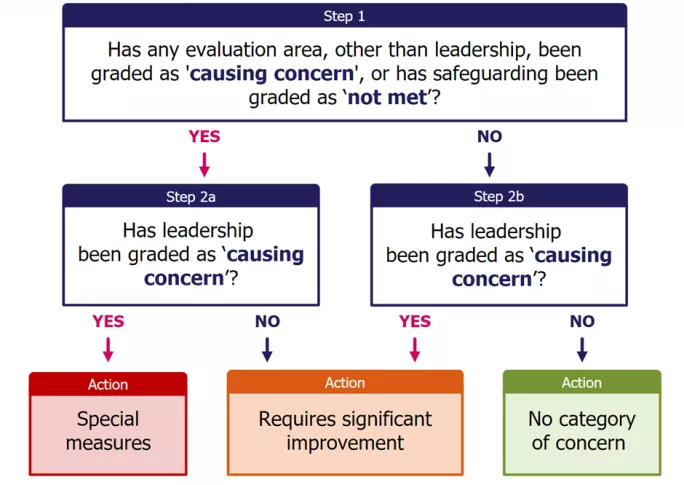Stuck school intervention plan ŌĆścomplete nonsenseŌĆÖ, say leaders

Government proposals for deciding when to academise stuck schools are unfair and ŌĆ£incredibly high stakesŌĆØ, headteachersŌĆÖ leaders have warned.
Both of the main school leader unions say that the Department for Education appears to have created an intervention category that is harder to get out of than it is to fall into.
This week, Ofsted and the DfE have launched consultations on a new inspection framework and plans for intervening in schools.
The DfE has said that its Regional Improvement for Standards and Excellence (RISE) teams will initially be working with so-called ŌĆ£stuck schoolsŌĆØ. From next September, they will work with schools that Ofsted has judged to ŌĆ£require significant improvementŌĆØ (RSI).
Definition and plans for a ŌĆśstuckŌĆÖ school
It has identified just over 600 stuck schools. For now, this includes those judged ŌĆ£requires improvementŌĆØ at their most recent inspection and less than ŌĆ£goodŌĆØ at the inspection before this.
But the department is also proposing a new definition of a stuck school, in light of the fact that OfstedŌĆÖs new report cards will not provide single-phrase overall judgements. Instead, proposed report cards will judge schools across at least eight areas on a five-point scale: causing concern, attention needed, secure, strong and exemplary.
The DfEŌĆÖs new definition of a stuck school is one with an ŌĆ£attention neededŌĆØ rating against leadership and governance, and that was graded below ŌĆ£goodŌĆØ - or equivalent - at its previous Ofsted inspection.
A says these schools would receive two years of support.
The document says that, once reinspected after this time, if schools have not achieved ŌĆ£secureŌĆØ ratings ŌĆ£in all areasŌĆØ, then the governmentŌĆÖs ŌĆ£defaultŌĆØ approach will be to move to structural intervention - meaning academisation or rebrokering an academy to a new trust.
- Linked: More than 9 in 10 heads reject report card plan
- Report cards: Everything you need to know about OfstedŌĆÖs inspection plans
- Need to know: What are inspectors set to judge schools on?
HeadteachersŌĆÖ leadersŌĆÖ concerns
HeadteachersŌĆÖ leaders fear that improvements made by stuck schools during the two years will go unrecognised unless they are uniformly spread across every single area that report cards will cover.
James Bowen, the NAHT school leadersŌĆÖ union assistant general secretary, said: ŌĆ£Is the DfE really proposing that any single ŌĆśattention neededŌĆÖ rating across eight to 10 areas would mean the schools it is classing as stuck are deemed not to have improved enough and could then face structural intervention?ŌĆØ
He warned that the DfE appeared to have designed a system ŌĆ£where it is easier to fall into an intervention category than it is to get out of it, and where the final trigger for a school being academised or rebrokered could be a single ŌĆśattention neededŌĆÖ ratingŌĆØ.
ŌĆ£That is surely unfair on schools and will make the school improvement process incredibly high stakes from the outset. It also seems to be at odds with the aim of producing a more nuanced profile of a school over time,ŌĆØ he added.
The DfE is proposing a similar approach for schools found to be ŌĆ£requiring significant improvementŌĆØ by Ofsted.
ŌĆśSetting them up to failŌĆÖ
RSI is a new category of concern for schools, replacing ŌĆ£serious weaknessesŌĆØ - which Ofsted applied to some schools that were rated as inadequate.
For the first year of the new Ofsted inspections, schools in this category will be academised or rebrokered - but from September 2026 they will receive RISE support.
The DfE consultation says Ofsted is proposing that RSI will have five monitoring inspections within 18 months, unless the issues have been resolved earlier.
If after that, the school is still causing concern, Ofsted would conduct a full reinspection. If the school is still judged to require significant improvement or has ŌĆ£needs attentionŌĆØ ratings, ŌĆ£our default approach will be to make structural changeŌĆØ, the DfE consultation says.
Tom Middlehurst, the Association of School and College LeadersŌĆÖ deputy director of policy, warned that requiring schools to achieve ŌĆ£secureŌĆØ in all categories within two years and 18 months respectively ŌĆ£does sound like setting them up to failŌĆØ.
ŌĆ£With eight or more areas of inspection, is the Department for Education really going to academise or rebroker them if they fail to achieve ŌĆśsecureŌĆÖ in a single category at the end of that time? That would mean all the positive work in all those other areas would be deemed not to show sufficient signs of improvement. This is surely complete nonsenseŌĆØ.
Ofsted and the DfE are running consultations on their plans, closing on 28 April.
A Department for Education spokesperson said:╠²ŌĆØWhere schools are stuck it is important that action is taken to secure rapid and sustainable improvement for the sake of their pupils, who only get one chance to get a great education.╠²
ŌĆ£Through our RISE teams, the schools will receive the support of leaders with a track record of driving high school standards.╠² ╠²We have high expectations of schools, and ŌĆśsecureŌĆÖ or better in all evaluation areas is the benchmark we think stuck schools should aspire to. ╠²Our consultation is open for 12 weeks and we welcome views from everyone.ŌĆØ
ŌĆśVery complicated and very clunkyŌĆÖ
The unions have also raised concerns at the level of complexity involved in both the new Ofsted framework and the DfEŌĆÖs plans to use report cards to direct RISE teams.
Mr Bowen added: ŌĆ£The two consultations together seem to have created an incredibly complicated system, and rather than tidying up what we had before, there now seems to be added layers of complexity and a whole host of new definitions as well as multiple new criteria and judgements.ŌĆØ
OfstedŌĆÖs plans include a flowchart explaining how it will decide whether a school causing concern is placed in special measures or RSI.

The fact that a flowchart is required to explain the plan ŌĆ£rather demonstrates how unnecessarily complicated it has all becomeŌĆØ, Mr Bowen said.
Mr Middlehurst said the attempt to ŌĆ£map report cards onto the support and intervention systemŌĆØ seems ŌĆ£very complicated and very clunkyŌĆØ.
He told Tes there should have been a considered process of gathering evidence and feedback from all stakeholders ŌĆ£rather than concocting a plan in Whitehall and charging ahead with a consultation on what is obviously a preferred modelŌĆØ.
ŌĆ£It is far too hasty and a recipe for disaster,ŌĆØ he said.
╠²
╠²
Register with Tes and you can read two free articles every month plus you'll have access to our range of award-winning newsletters.
Keep reading with our special offer!
YouŌĆÖve reached your limit of free articles this month.
- Unlimited access to all Tes magazine content
- Save your favourite articles and gift them to your colleagues
- Exclusive subscriber-only stories
- Over 200,000 archived articles
- Unlimited access to all Tes magazine content
- Save your favourite articles and gift them to your colleagues
- Exclusive subscriber-only stories
- Over 200,000 archived articles



